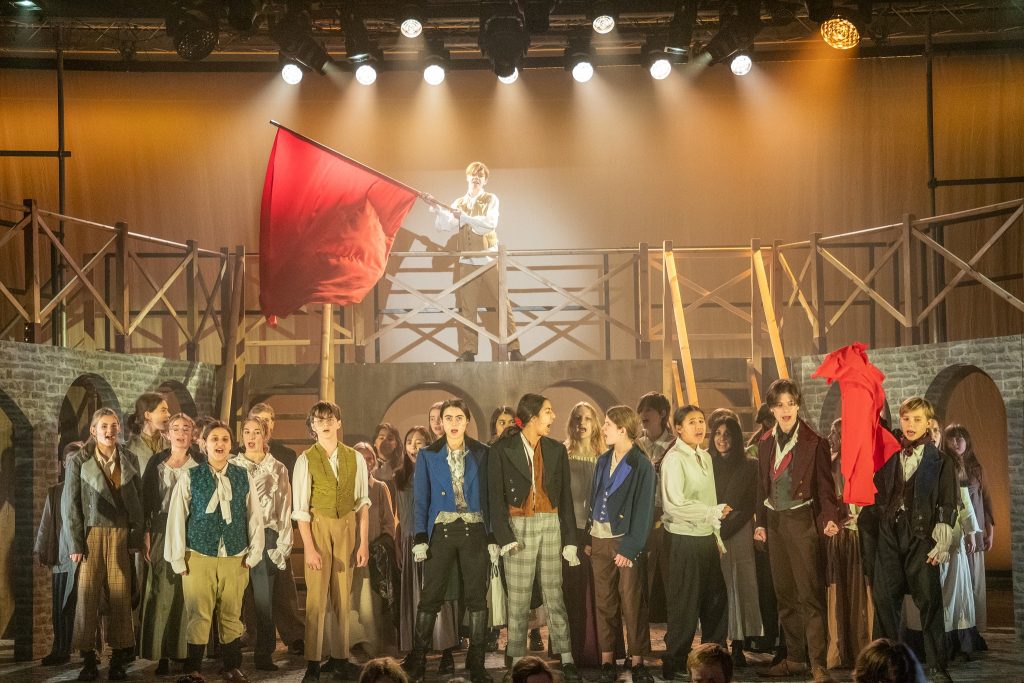Drama at Forest School
Head of Department: Mrs S Moon slm@forest.org.uk
Drama is a highly practical qualification that gives you a range of opportunities to showcase your creativity. From devising your own work to studying the works of world-renowned playwrights’ and theatre practitioners, you will explore theatre through the eyes of a performer, a designer, and a director.
Developing an insight and an understanding of stagecraft through experiencing and responding to live theatre. Drama teaches about cultures and histories, as well as placing an emphasis on effective communication and working collaboratively.
Our rich curriculum includes:
- Trips to the National Theatre.
- Trip to museums such as the V+A.
- Several trips to watch Live Theatre.
- Workshops with theatre practitioners such as Complicite, Frantic Assembly and Splendid.
- Teacher surgeries to support your progress.
- Performing or designing for multiple productions.
- Visits from touring theatre companies such as Quirky Birds.
- Hands on training from the in-house Theatre Technician.
GCSE and A-level Overview
The Eduqas GCSE in Drama qualification enables students to:
• Explore performance texts, theatrical styles, practitioners and genres
• Develop performance skills through practical lessons and performances
• Devise original theatre from a stimulus
• Perform extracts from a published play
• Design for extracts from a published play
• Work collaboratively
• Work independently on research projects
• Develop the skills required for a performer, designer and a director
• Develop analytical and evaluative skills
• Gain an appreciation for the different roles within contemporary theatre
• Develop an appreciation for the intentions of professional theatre makers
• Watch live theatre
The AQA A Level in Drama and Theatre qualification enables students to:
• Explore performance texts, theatrical styles, practitioners and genres
• Develop performance skills through practical lessons and performances
• Devise original theatre from a stimulus
• Perform extracts from a published play
• Design for extracts from a published play • Work collaboratively to develop ideas
• Work independently on research projects
• Develop the skills required for a performer, designer and a director
• Develop analytical and evaluative skills
• Gain an appreciation for the different roles within contemporary theatre
• Develop an appreciation for the intentions of professional theatre makers
• Develop creativity
• Explore social, historical and cultural contexts of performance texts
• Watch live theatre
Assessment at GCSE and A-level
GCSE:
- Component 1: Devising Theatre (40% of qualification) – Internally assessed.
- Realisation of devised theatre or design
- A portfolio of supporting evidence
- An evaluation of the final performance or design.
- Component 2: Performance from a Text (20% of qualification) – Externally assessed.
- Component 3: Interpreting Theatre (40% of qualification) – Written examination – 1 hour 30 minutes
A Level:
- Component 1: Drama and theatre (40% of qualification) – Written examination – 3 hours
- Component 2: Creating original drama – devising (30% of qualification) – Internally assessed.
- Realisation of devised theatre or design, a working notebook.
- Component 3: Making theatre – scripted (30% of qualification) Externally assessed.
- Practical exploration of 3 extracts, examined performance of extract 3 or design, reflective report.
Curriculum Maps – All Years
How can Theatre change the world?
Theatre always has, and always will have, the power to change the world. It has been used by humanity throughout history as a way of making sense of itself and to challenge and reflect life experiences. Drama and theatre give you an opportunity to convey your own unique perspective to others. It can provide moments of escapism, clarity, and education. Above all else Drama and Theatre provide you with opportunities to let your creativity flourish.


